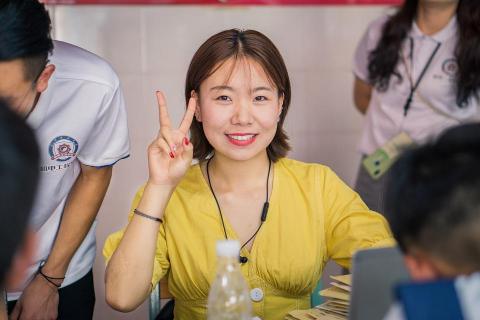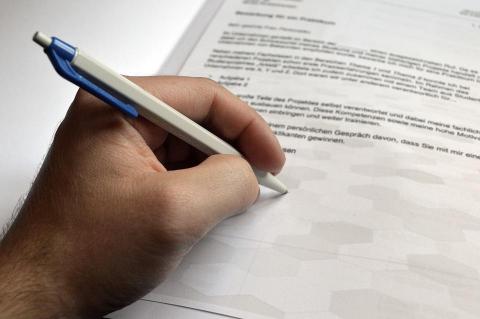
Prepare a PhD
The PhD degree attests skills acquired through research in the framework of the doctoral training, which has a 3 years reference duration when the research work is carried out full-time, and a 3 to 6 years duration when the thesis is prepared part-time. The PhD degree can also be obtained by the validation of the acquired experience (VAE).
The PhD degree - the highest internationnaly recognized by higher education - is awarded after the defense of a thesis or the presentation of a set of original scientific works.

The different frameworks to prepare a PhD
- Initial traininf (IF in French)
- Lifelong training, excluding initial training (FTLVin French)
- Validation of the experience acquired (VAE in French)

Admission to PhD training
- A file
- A procedure
- Examination of an application
Three regimes for three PhD preparation frameworks
Registration in initial training is possible as a continuation of a master or other equivalent degree.
- In initial training, the PhD is full time prepared
The preparation is initially set to last 3 years. Beyond this 3 years, extensions of the duration of preparation are possible, with derogation. - Funding dedicated to the preparation of the thesis is requested for a registration in initial training.
The reference amount of this funding corresponds to the remuneration of the PhD contract established by public law.
Derogations from this funding threshold can be requested from the head of the establishment.
PhD students have a main research activity in one of the research team or unit of the doctoral school.
They also have complementary PhD activities and training, intended to develop their scientific culture, their international openness and to prepare their professional future. The PhD program is personalized and defined with each doctoral school, in a framework commin to all PhD students at Université Paris-Sacaly.
They can have complementary activities outside research, which contribute to the preparation of their professional future (teaching mission, scientific mediation, expertise of promotion of research), limited to one sixth of their time each year.
- A thesis monitoring committee report must be submitted by the PhD student for each of their re-registrations.
Registration in lifelong training concerns two categories of people :
- Those who obtained their last diploma more than two years before the desired date of first enrollment in a PhD (whether the thesis is prepared full-time or part-time, and regardless of the financing conditions envisaged)
- Those who plan to prepare their thesis at the same time as a main activitiy other than the preparation of thesis, regardless of the date of the obtention of the last degree. The main activity means that its provides more than half of the income.
- Lifelong training does not two types require a funding dedicated to the thesis preparation, but its comission ensures, before the first registration, that material and financial conditions are correct.
Ultimately, candidates who have no funding to prepare their thesis and have no income from their main activity could prepare a thesis, as long as the doctoral school and the commission can ensure that the material and financial resources conditions.
In lifelong learning, the PhD can be prepared on a part-time basis.
- The duration initially fixed for the preparation of the thesis depends on the time that can be devoted to its preparation. It is between 3 and 6 years.
- A derogation must be requested to extend the duration of the PhD beyond the one initially fixed. Its could be discussed during the monitoring committee taht takes place each abnd every year before re-registration.
PhD students prepare their thesis in one of the research teams or units of their doctoral school. The distributio of their time between the research unit and their non-research activities is fixed from the first registration.
As PhD student in initial training, PhD student in lifelong training also have PhD complementary activities and training, intended to develop their scientific culture, their international opennes, and to prepare their professional future. Still, their training courses are arranged to feet with the specificities of their situation.
A thesis monitoring committee must stand each and evrey year, before re-registration. Among other things, it help to check whether the conditions of the lifelong training PhD are suitable, or deserve to be rearranged.
Unlike initial training and lifelong training, registration for a validation of the experience acquired can only be done when the original scientific work constitutes a coherent whole, that what makes possible to consider a defense. Those works may have been carried out partly in a research unit of the doctoral school (for example, within the framework of a volunteer researcher agreement), or entirely outside the academic framework.
- PhD degree is awarded after a thesis defense or a presentation of the original scientific works.
To obtain a PhD degre by a validation of the experience acquired, the candidate must:
- Write a thesis or a dissertation to assess the personal part of collective work. This dissertation or thesis will be evaluated by two rapporteurs and by a defense jury. Composition and expectations of the jury are the same as the ones for the initial training or the lifelong training PhD
- As for the PhD students, the thesis or the dissertation will have to be legaly deposed and, if necessary published on the national portal www.theses.fr
- An accompanying, chosen among the supervisors of the doctoral school, can be offered for the preparation of the thesis or the dissertation
- The work having been prepared before registration in the Validation of the experience acquired, the accompanying is not a thesis director. He does not ensure the scientific direction of the research work, but guides the candidate in the preparation of the dissertation or thesis.
- He plays the role of thesis director for the defense (in particular to propose the defense)
Documents relating to the preparation of a validation of the experience acquired
- Procedure

- Admissibility file
- The vademecum "Validation of the experience acquired and PhD"
- The charges
Admission to a PhD Programme
A PhD application is a complete package that includes
- A candidate with a research project
- An original thesis topic
- A thesis director
- A team to host the research
- A proposed funding or a proof that the material and financial conditions necessary for the successful completion of the doctoral thesis
Candidates apply to the doctoral school that their research or team unit is attached to via the Université Paris-Saclay application portal. Their PhD director must also be attached to that doctoral school.
An application is considered to have been submitted only once it has been completed and finalised. To do this, candidates must :
- Have submitted all the documents requested by the doctoral school
- A thesis subject
- Information on the contions of the doctoral programme (thesis supervision, research unit)
- CV
- Transcripts
- Other documents required by the doctoral school - Obtain a favourable opinion from the thesis director
- Obtain a favourable opinion from the research or team unit director to wich the thesis directors responds
The application process is carried out via internet tool ADUM - an administrative tool for management of the PhD, from application to graduation.
Data recorded in ADUM are subjected to the RGPD regutions.
Once the complete file has been submitted and the application has been finalised, it is examined by the doctoral school to which the applicant belongs.
- In case of a favorable opinion on the application file, the candidate then presents his/her doctoral project and previous research experience during an audition, in front of a admission committee organised by the doctoral scool. This hearing is required in both initial formation and lifelong training, and regardless the conditions of funding and the progress of the thesis preparation envisaged.
- If the admissions committee gives a favourable opinion, the future PhD student may registered for the first time.
